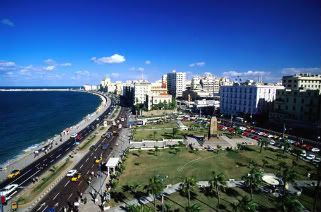The Ancient Library of Alexandria
Once the largest library in the ancient world, and containing works by the greatest thinkers and writers of antiquity, including Homer, Plato, Socrates and many more, the Library of Alexandria, northern Egypt, is popularly believed to have been destroyed in a huge fire around 2000 years ago and its volumous works lost.
 Since its destruction this wonder of the ancient world has haunted the imagination of poets, historians, travellers and scholars, who have lamented the tragic loss of knowledge and literature. Today, the idea of a ‘Universal Library’ situated in a city celebrated as the centre of learning in the ancient world, has attained mythical status.
Since its destruction this wonder of the ancient world has haunted the imagination of poets, historians, travellers and scholars, who have lamented the tragic loss of knowledge and literature. Today, the idea of a ‘Universal Library’ situated in a city celebrated as the centre of learning in the ancient world, has attained mythical status.
The mystery has been perpetuated by the fact that no architectural remains or archaeological finds that can definitely be attributed to the ancient Library have ever been recovered, surprising for such a supposedly renowned and imposing structure. This lack of physical proof has even persuaded some to wonder if the fabulous Library actually existed at all in the form popularly imagined.
Ancient Alexandria
Once home to the massive Pharos lighthouse, one of the Seven Wonder of the Ancient World, the Mediterranean seaport of Alexandria was founded by Alexander the Great around 330 BC, and like many other cities in his Empire, took its name from him. After his death in 323 BC, Alexander’s Empire was left in the hands of his generals, with Ptolemy I Soter taking Egypt and making Alexandria his capital in 320 BC. Formerly a small fishing village on the Nile delta, Alexandria became the seat of the Ptolemaic rulers of Egypt and developed into a great intellectual and cultural centre, perhaps the greatest city in the ancient world.
The Origins of the Ancient Library
The founding of the Library of Alexandria, actually two or more libraries, is obscure. It is believed that around 295 BC, the scholar and orator Demetrius of Phalerum, an exiled governor of Athens, convinced Ptolemy I Soter to establish the Library. Demetrius envisioned a library that would house a copy of every book in the world, an institution to rival those of Athens itself. Subsequently, under the patronage of Ptolemy I, Demetrius organised the construction of the ‘Temple of the Muses’ or ‘the Musaeum’, from where our word ‘museum’ is derived. This structure was a shrine complex modeled on the Lyceum of Aristotle in Athens, a centre for intellectual and philosophical lectures and discussion.
The Temple of the Muses was to be the first part of the library complex at Alexandria, and was located within the grounds of the Royal Palace, in an area known as the Bruchion or palace quarter, in the Greek district of the city. The Museum was a cult centre with shrines for each of the nine muses, but also functioned as a place of study with lecture areas, laboratories, observatories, botanical gardens, a zoo, living quarters, and dining halls, as well as the Library itself. A priest chosen by Ptolemy I himself was the administrator of the Museum, and there was also a separate Librarian in charge of the manuscript collection. At some time during his reign from 282BC to 246BC, Ptolemy II Philadelphus, the son of Ptolemy I Soter, established the ‘Royal Library’ to complement the Temple of the Muses set up by his father.
It is not clear whether the Royal Library, which was to become the main manuscript Library, was a separate building located next to the Museum or was an extension of it. However, the consensus of opinion is that the Royal Library did form part of the Temple of the Muses.
During the reign of Ptolemy II, the idea of the Universal Library seems to have taken shape. Apparently more than 100 scholars were housed within the Museum, whose job it was to carry out scientific research, lecture, publish, translate, copy and collect not only original manuscripts of Greek authors (allegedly including the private collection of Aristotle himself), but translations of works from Egypt, Assyria, Persia, as well as Buddhist texts and Hebrew scriptures.
One story goes that the hunger of Ptolemy III for knowledge was so great that he decreed that all ships docking at the port should surrender their manuscripts to the authorities. Copies were then made by official scribes and delivered to the original owners, the originals being filed away in the Library.




